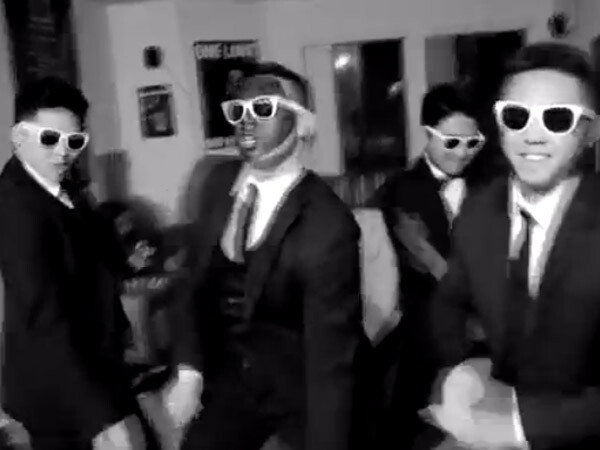Blackface Video: College Lessons Learned, The Hard Way

The purpose of the video was innocent enough: To promote an upcoming installation dinner for the University of California, Irvine's Lambda Theta Delta fraternity, with four members gleefully dancing and lip-synching to Justin Timberlake's and Jay-Z's hit song, "Suit and Tie."
That is, until one of the members performed in blackface.
Social media channels, particularly in the Asian American community, caught wind of it over this past week and vehemently denounced it. The popular Angry Asian Man blog fired off, "It makes me want to drive the distance to Irvine and shake the stupid out of somebody." The blog also pointed out that Asian Americans make up over 50 percent of UC Irvine's student body, while African Americans only comprise three percent.
"It throws back the curtain on the larger, more troubling issue of marginalization on campus," the blog added.
Inevitably, people were angered, the original video was taken down, apologies were made, the members in question were reprimanded by the fraternity, threats were made on the perpetrators, and, as of this writing, an investigation is being made by the university on whether to bring disciplinary action to the students.
College is meant as a place where people attain a deeper and more universal understanding of learning, but a funny thing happens once many kids go to college -- outside of the classroom, many students, regardless of their particular race, ethnicity or nationality, usually tend to stick to their own kind. A considerable difference from high school, when students were grouped more in terms of musical genres or personal interests.
A large number of Asian American college students hail from relatively-comfortable suburban environments. Though some families, particularly the newly-immigrated, start off in the city, after attaining a certain income level the parents eventually leave behind the societal ills of urban life in favor of "a nicer place to raise the kids" -- the great cachet of The American Dream. For people of immigrant backgrounds, adopting the traits of outside cultures is a form of both assimilation and rebellion, and all of us do it to varying degrees.
From Filipino American DJs to Korean American rappers, to Japanese Americans performing spoken-word poetry, Asian Americans have long admired African American culture, even before the advent of hip-hop. But unless one grew up with African Americans, or is exposed to black culture on a regular basis, that understanding of African American culture is largely superficial. Especially since "African American culture" actually encompasses just as many variations and subcultures as "Asian American culture." And most especially, the more you really know about someone else's culture, the more you can actually recognize its similarities to your own.
While performing in blackface is historically-entrenched as a racist act, racial dynamics being as complex as they are, there is a difference between acts of hatred and acts of ignorance.
When white UCLA student Alexandra Wallace caused a similar furor in 2011 over her YouTube monologue rant about the idiosyncrasies of Asian students in the school library, it was done with the intention to insult, although she probably assumed that more people would agree with her than take offense.
The original UCI fraternity video reportedly contained a disclaimer that read, "No racism intended." Though it was most likely not done out of any negative feelings toward African Americans, the simple act of performing in blackface bore such a heavy stigma, the makers of the video were likely too oblivious to its weight.
But perhaps the crux of the problem lies not in in anything that has to do with Asian or African American culture, but in a narcissistic contemporary culture where social competency is measured in "Views," "Likes," and "Shares." Whereas the video, even sans the racially-offending scenes, is done solely for the self-amusement of those involved, and the risk of causing offense is perhaps perceived as a small price to pay for potential viral popularity. In the case of both the UCI fraternity and Alexandra Wallace -- at least at the time of upload -- consequences be damned.
Of course, when those consequences turn out to be real-life threats, a serious disruption to one's academic well-being, and a blemished social standing, it suddenly becomes a monumental mistake.
Most Asian Americans have used the power of YouTube and social media for creative expression, and for positive empowerment. But the UCI Lambda Theta Delta fraternity's "blackface" video is a textbook example of an "Epic Fail."
College is meant as a place where people attain a deeper and more universal understanding of learning, but for some students, their lessons are learned the hard way.